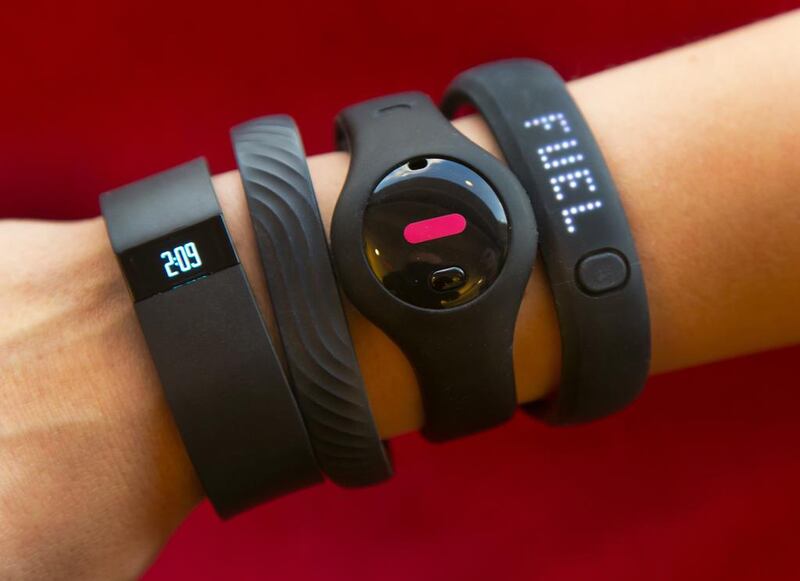Last night, I slept for six hours and 10 minutes, although only 30 of those minutes were spent in deep sleep. A sizeable 47 were spent awake. So far today, I have clocked up 4,652 steps, consumed 987 calories (29 per cent of which were in protein form) and my resting heart rate is averaging around 72 beats per minute. I have also received various semi-patronising messages on my phone and wrist, encouraging me to “take a stroll”, “log my breakfast” and “remember my goals”.
Exactly how many minutes I have spent logging, checking and tracking all these details in recent months is a whole other question. I have, like many others before me, become a slave to my Fitbit. Not to mention my calorie-counting app. And the My Zone exercise tracker. I am essentially distilling my everyday existence into a series of numbers.
I initially invested in a Fitbit because I thought it would be good to know how many steps I was taking every day. As a largely sedentary office worker and long-time commuter, I thought it would be the perfect motivator to get me moving more. As it turns out, I was OK on the step front, getting close enough to the 10,000 mark most days.
The big shock was how little sleep I was getting. In my head, I was on a solid seven to eight hours of high-quality slumber most nights. But the Fitbit told a different tale. In truth, I average between five and six hours of sleep most nights, and the majority of that falls into the “light” category. And while I have always had a pretty good idea of what foods are considered healthy and nutritious, my calorie-counting app has encouraged me to be more mindful about portion size and more balanced in my approach to various food groups.
But our slightly obsessive culture of “tracking” can yield both positive and negative results. The myriad devices and apps that we use to measure the minutiae of our everyday existence offer up a stark, unapologetic, unflinching view of our daily habits. For many people, it’s the wake-up call required to introduce change. Others respond to the fact that it’s a results-orientated way to take control of their health.
However (and I can attest to this), the health-tracking process can also be time-consuming, disheartening and encourage OCD tendencies. Many studies suggest that it is unsustainable in the long term – people either get bored or, having been confronted by their repeated failure to clock up 10,000 steps or eat fewer than 1,500 calories or whatever other goal de jour, are too disheartened to continue.
At the Cheltenham Science Festival this month, neurologist Dr Guy Leschziner maintained that sleep-tracking apps can actually be counter-intuitive to getting a good night's sleep. "We've seen a lot of people who have developed significant insomnia as a result of either sleep trackers or reading certain things about how devastating sleep deprivation is for you," he said.
He also said that the latest compulsion to analyse our sleeping habits is part of a wider movement to "metricise our lives". The problem with this is that we are trying to apply hard and fast logic to something that is immensely complicated. Health isn't simple maths. Health is the result of an unendingly complicated array of factors – and to imagine that the little rubberised gadget on your wrist can offer up all the answers can lead to gross assumptions and oversimplifications.
There’s also the danger that these technological aids drown out genuine self-reflection and systemic behavioural change. Did you take that walk this morning because you were genuinely trying to do something positive for your health, as part of a wider, long-term effort to overhaul your lifestyle, or because you wanted to up today’s step count?
Instinct has held us in good stead for millennia – and maybe these apps are making us forget to listen to our bodies. After all, how you are feeling is more important than how you are tracking. That number says nothing about whether a certain type of food makes you feel groggy or energised. It cannot measure the elation you feel after completing a particularly gruelling workout, or the satisfaction of filling yourself with a meal that is both tasty and healthy.
Your body will tell you that it prefers moving to sitting; it will tell you that it operates better after a good night's sleep; that you need a glass of water rather than a snack; or a snooze instead of a Starbucks coffee. And the holy grail of 10,000 steps is an arbitrary number, after all – it is believed to have originated in Japan, as part of a marketing campaign to promote a pedometer called the Manpo-kei, which literally translates as "10,000 steps meter". You may have completed those steps, and been rewarded by a shower of fireworks on your Fitbit monitor, but were they a slow and sauntering 10,000 steps or 10,000 steps completed with purpose?
I will be trying to remind myself that tracking should be viewed more as a catalyst to encourage a change in behaviour, rather than the be all and end all when it comes to our every move.












